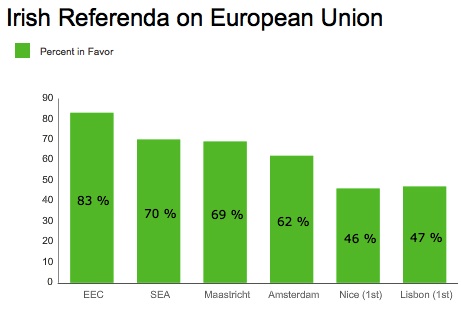Ireland’s feisty voters, which have developed an art form out of defeating European Union treaties, still seem likely to support the fiscal compact treaty in Thursday’s referendum:
Polls show the ‘yes’ vote in the lead — the latest Irish Times poll shows 39% in favor, 30% opposed, with 22% undecided and 9% not voting. Other polls have shown even strong support for the ‘yes’ camp.
After the Sturm und Drang of May 2012’s electoral wave, which has seen voters support anti-austerity politicians from Germany to Greece, the fiscal compact seems to have less momentum than ever.
So it would be a plucky twist of fate if Ireland, which has become the bête noire of EU treaty making — its constitution provides that a EU treaty is an amendment of the Irish constitution and, consequently, must be approved in a referendum — gives a thumbs-up to a fiscal compact that might never go into law EU-wide and would result in a loss of Irish sovereignty with respect to its own fiscal policymaking.
Furthermore, over the course of Ireland’s four decades in the EU, Irish voters have voted on six treaties, and in each case, the initial pro-treaty vote has decreased for each new treaty:

In each of the last two efforts, for the Treaty of Nice in 2001 and the Treaty of Lisbon in 2008, Irish voters initially defeated the treaty, Irish negotiators worked to attain new concessions from the EU and each treaty was subsequently ratified in a second referendum.
The fiscal compact, cobbled together by Merkel and then-French president Nicolas Sarkozy in December 2011 amid soaring bond prices for Spanish and Italian debt, would limit each EU member state to a structural budget deficit of just 0.5% of GDP. That target seemed unrealistic in November, but seems even more so today, with many European economies still stagnant (or in recession). Newly elected French president François Hollande has called for revisiting the terms of the fiscal compact during and after his election.
So the final ratification of the fiscal compact is far from certain, with or without Ireland. As the UK and the Czech Republic opted out of the fiscal compact, the fiscal compact is not, as a technical matter, a formal EU treaty. Accordingly, it needs ratification from just 12 eurozone members before January 1, 2013 to go into effect.
As of today, it has received just three conditional ratifications. In Slovenia and Portugal, national parliaments have approved the fiscal compact, but the ratifications are not formally complete without presidential approval. The only other country to ratify the fiscal compact is Greece, whose May parliamentary elections were so inconclusive that the country must hold a second set in June, which could very well result in electing Europe’s most anti-austerity government.
So why, in the face of so many reasons to junk the fiscal compact, which may not even be ratified by the rest of Europe, are Ireland’s voters set to approve it on Thursday? Continue reading Irish set to approve fiscal compact in Thursday referendum →
![]()
